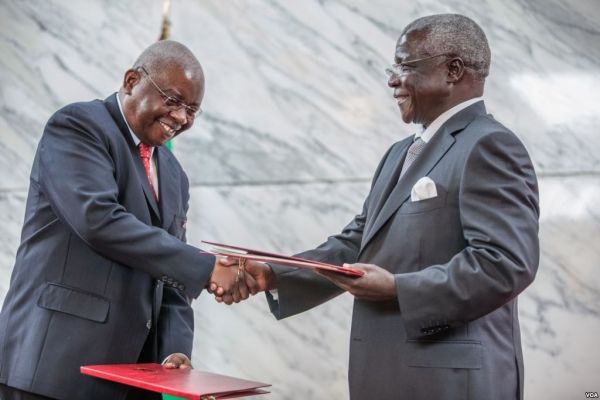Peace deal in Mozambique ahead of elections
Renamo leader comes out of hiding to run for president
Mozambican president Armando Guebuza and Renamo rebel leader Afonso Dhlakama signed a landmark peace deal in Maputo on 5 September, ahead of the country's presidential elections on 15 October.
The deal between the government and the rebels ends a two-year insurgency that has caused scores of deaths in central Mozambique and damaged the country's tourism and mining industries. Dhlakama, who only came out of hiding on 4 September, will now run for president in the upcoming election which the ruling Frelimo party is expected to win comfortably.
Both leaders hailed the importance of the deal however Dhlakama accused the government of "intolerance" and said he hoped the accord could "bring to an end the one-party state".
Under the terms of the agreement Dhlakama's rebels will be integrated into the Mozambican army while Guebuza promised a "peace and reconciliation fund" for war veterans.
As the Mozambican election campaign takes off, Italy has taken credit for its role in the peace agreement. Italian premier Matteo Renzi said that his government played a decisive role in helping to broker the deal during his visit to Maputo in July.
Dhlakama has lost every presidential election since 1994 and political analysts believe that he could even lose his position as main opposition figure to Daviz Simango of the Mozambique Democratic Movement (MDM).
Guebuza is constitutionally barred from seeking a third term of office, and the Frelimo candidate will be former defence minister Filipe Nyusibut.
There are fears in Mozambique that the 2014 election polls could be marred by violence. Over the past couple of years armed supporters loyal to Dhlakama had been engaged in guerilla-style attacks mainly in the central Sofala province. The rebels clashed with police and military, killing several dozen people, attacking civilian vehicles and disrupting foreign investment.
Dhlakama has consistently accused the state of reneging on a peace deal that ended Mozambique's civil war, a brutal 15-year conflict which resulted in one million deaths and ended in 1992. Renamo accuses Frelimo, which has governed Mozambique since independence from Portugal in 1975, of monopolising political and economic power in a nation where more than half the population still lives in poverty, despite being one of Africa's fastest-growing ecomonies.














